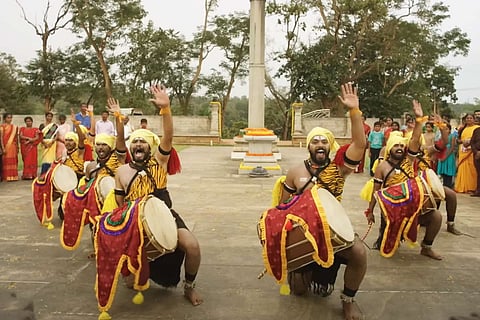

In Sagar Puranik’s Dollu, art isn’t just an expression but also an instrument of cultural change. At first glance, the film is a vocal supporter of Dollu Kunitha, a vibrant but waning Karnataka folk tradition that involves bombastic drumbeats, dance and devotion in perfect synergy. But when looked at closely, it is also an overarching take on the conflicted nature of artforms and traditions in India, and how they have always lacked inclusivity.
Bhadra (Karthik Mahesh) has inherited Dollu Kunitha from his father in all its sanctity. For the latter, the artform is never a means to make money but a whole-hearted submission to the almighty, so when his son tries to combine both, the result is disappointment and fury. But Bhadra’s intent isn’t to malign the artform either because, as the only remaining custodian of Dollu Kunitha in his village, he is facing his own stiff battle with the disillusionment of his fellow artists.
Bhadra’s Dollu Kunitha group, comprising eight splendid artists, is coming apart at the seams because everyone except him is moving to Bengaluru in hope of a better and different life. If the group doesn’t perform at the annual village festival, the tradition will not just be paused but most likely become obsolete. But just as Bhadra is about to accept defeat, a ray of hope emerges from a most overlooked place.
The main charm of Dollu is its simplicity. The film never aspires to be what it isn’t and the debutant director keeps things intentionally simple and unembellished. Yet, he ensures that the narrative is crisp in terms of both writing and runtime. For this, the writers use a familiar structure and style in which the characters speak out their minds in clear words and leave very little room for subtext but never coming across as unnuanced. While most stories set in villages or small towns try to draw a human portrait by showing the closeness between the inhabitants, Dollu does so by dwelling on the one common dilemma of its people: can art alone help sustain a comfortable life? The same question is brought up in myriad ways, mostly in a prominent verbose form, but just on the cusp of becoming cliched, the director subverts things a little and lends the film a whole new dimension.
Sagar Puranik uses the conventional tools of a rural setting such as traditions, urban migration and gender bias, and employs them all in a deft manner to present a convincing tale that isn’t only about art conservation. While the flow of events in Dollu remains fairly predictable, the director stages the various scenes with such clarity and conviction that one never really tries to outguess the narrative. Instead, the viewer is likely to find themselves endeared by the lovely climax portion of the film and walk out with a smile.
A lot of the credibility must also be attributed to Abhilash Kalathi’s cinematography and Ananth Kamath M’s soundtrack. The former captures the quaintness of the village in isolated but very meaningful frames. There is a sense of rhythm to his camera work, which often switches between expansive drone shots to present the superb choreography of the dance events (mostly in a single take) and wide, panoramic shots of the village’s rustic beauty. Ananth Kamath’s background score is sparse but occurs at important moments with flair and the element of a percussive beat is retained throughout the film. Despite being all about dance and music, Dollu has only two songs to offer – ‘Shashwata’, sung by Vijay Prakash, and ‘Mayanagari’, rendered by the director himself.
Karthik Mahesh as Bhadra embodies the physical and emotional endurance of a Dollu performer to great effect and looks fully convincing every time he wields the drum. Nidhi Hegde and Sharanya Suresh play their respective parts to perfection and do not let the short screentime affect the relevance of their characters. While the rest of the cast, particularly the Dollu Kunitha group members, suffer a tad from the unidimensional writing and sometimes become mere mouthpieces of the film’s message, the writing still allows many of them to add substance to the film. The highlight, however, is the amazing synchrony between all the Dollu artists who don the avatar with tremendous grace and elan.
From start to finish, Dollu is an assured film because the director knows the exact film he is trying to make. It isn’t the most modern and cerebral film about art but is also far from being an inaccessible arthouse fare either. Dollu may not boast of big names or snazzy action or romance sequences but it packs a lot of drama and substance that it definitely warrants a trip to the cinema halls.
Disclaimer: This review was not paid for or commissioned by anyone associated with the film. Neither TNM nor any of its reviewers have any sort of business relationship with the film's producers or any other members of its cast and crew.